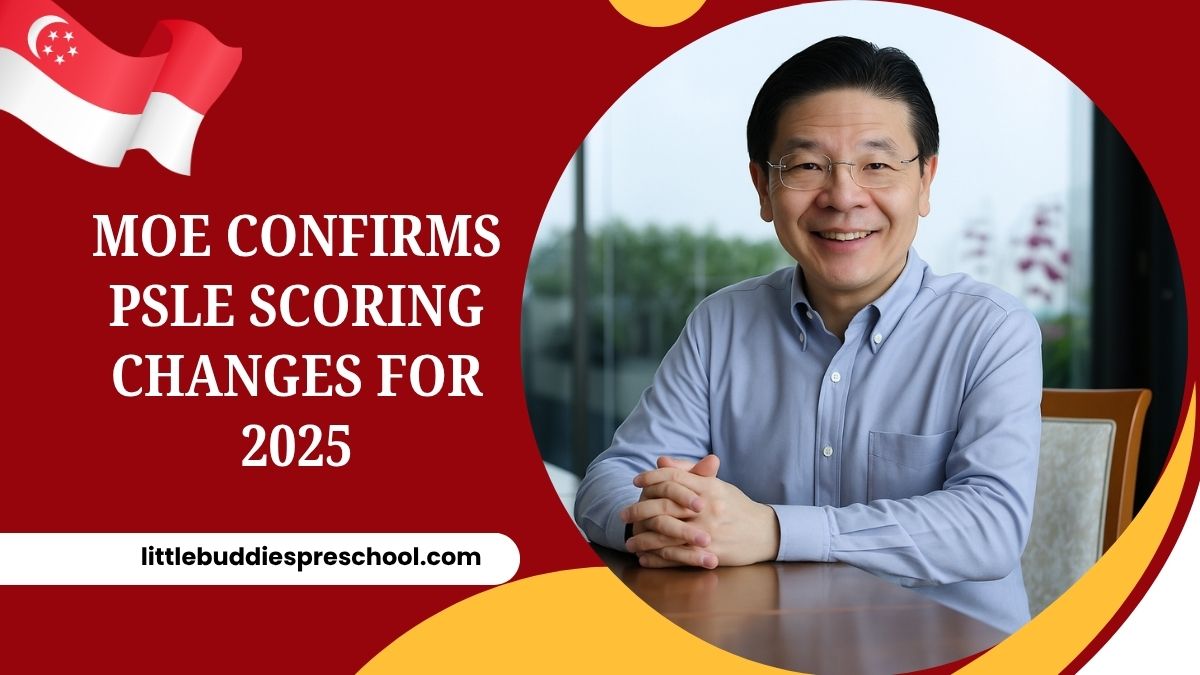The Ministry of Education (MOE) in Singapore has officially unveiled comprehensive changes to the Primary School Leaving Examination (PSLE) scoring system, taking effect in 2025.
These updates are set to transform how academic success is measured—moving away from student-to-student comparisons and toward a model that values personal growth, mastery, and holistic development.
Quick Overview: PSLE 2025 Reform at a Glance
| Aspect | Details |
|---|---|
| New System | Achievement Levels (ALs) replace T-score |
| Score Range | 4 (best) to 32 (lowest) |
| Grading Scale | 8 AL bands per subject |
| Subjects | English, Mother Tongue, Math, Science |
| Admissions | Based on AL score + ranked school preferences |
| Replaced System | T-score system (relative ranking) |
| Focus Areas | Subject-Based Banding, CCAs, holistic growth |
| Official Source | www.moe.gov.sg |
Comparing the Old and New PSLE Scoring Systems
| Component | T-Score System (Before 2025) | Achievement Level System (2025 Onward) |
|---|---|---|
| Score Basis | Relative to peers | Based on fixed academic standards |
| Overall Score Range | 0–300+ | 4 to 32 |
| Grading Format | Point-by-point ranking | 8 distinct AL bands per subject |
| School Placement | Score-driven | AL score + ranked school preferences |
The outdated T-score model, which often penalized small score differences, will now be replaced with Achievement Levels (ALs) that allow students to be evaluated on their individual merit rather than in comparison to others.
Key Reforms Parents Should Understand
1. Subject-Based Banding (SBB)
Students will have the opportunity to learn subjects at varying levels of difficulty based on their strengths. This personalization recognizes diverse talents and allows students to excel where they perform best, even if they need more support in other areas.
2. Secondary School Admissions Reform
Rather than focusing solely on perfect scores, secondary school admissions will consider a student’s AL score combined with their ranked school choices. This provides more flexibility and encourages informed, holistic decision-making.
3. Emphasis on Holistic Education
Non-academic strengths are being increasingly valued. Co-curricular activities (CCAs), leadership roles, and community service will now play a greater role in a student’s educational journey, reflecting the importance of real-world skills and emotional intelligence.
Why the PSLE Overhaul Was Necessary
Years of concern from parents, educators, and psychologists prompted this shift. The old model often caused:
- Unnecessary academic pressure on young students
- A culture of peer competition over personal progress
- High levels of stress and anxiety among children
The new Achievement Levels aim to:
- Shift the focus to individual performance and improvement
- Reduce anxiety associated with high-stakes testing
- Encourage lifelong learning, adaptability, and resilience
This transformation aligns with Singapore’s broader “Learn for Life” educational philosophy.
Parental Guidance: How to Support Your Child Through the Transition
1. Learn About the AL System
Understanding the 8-band Achievement Level system helps parents guide their children with clarity and set attainable academic goals.
2. Explore Suitable School Options
Parents should work closely with their children to evaluate secondary schools based on interests, learning styles, and strengths, not just on academic reputation.
3. Promote Broader Learning
Encourage involvement in projects, CCAs, and community programs to build soft skills and confidence beyond the classroom.
4. Address Stress Early
Be proactive in recognizing signs of stress or burnout. Maintain open dialogue and ensure your child knows their self-worth isn’t tied to a score.
Broader Impacts on Singapore’s Education Landscape
This policy shift is not just about academic scoring—it marks a deeper change in how success is defined in education. The reforms will likely result in:
- A reduction in exam stress during critical learning years
- Greater diversity in teaching methods and assessments
- A more inclusive and supportive learning environment
- Students being better equipped for real-world challenges requiring creativity, empathy, and teamwork
By reshaping expectations, Singapore is setting the stage for a future-ready generation.
The PSLE scoring reform in 2025 marks a significant step toward a more balanced, student-centered education system in Singapore.
By prioritizing personal growth, resilience, and holistic development, the MOE is nurturing students to thrive not only in school but in life. Parents, educators, and students alike should embrace these changes as an opportunity to shift the focus from grades to growth.
FAQs
What is the main difference between the old T-score and new AL system?
The T-score ranked students against one another, while the AL system scores them against fixed standards to focus on individual learning progress.
How many AL bands are there per subject in the new PSLE system?
There are 8 Achievement Levels per subject, ranging from AL1 (highest) to AL8 (lowest).
How will school admissions work under the new scoring method?
Admissions will factor in the student’s total AL score and their ranked list of preferred secondary schools, rather than just the academic score.

